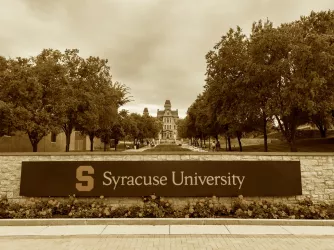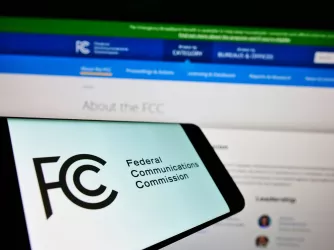Table of Contents
Confused about 501(c)(3) Obligations, College of St. Catherine Disinvites Political Speakers
During this politically charged election season, one would assume that colleges and universities would want to harness that excitement and engage their students by hosting a number of politically diverse speakers and lecturers. A recent article in the Minneapolis-area Star Tribune, however, relates that the College of St. Catherine has recently disinvited a number of speakers including Senator Hillary Clinton, Bay Buchanan, and Al Franken.
What is the college's rationale? According to St. Catherine Media Manager Julie Michener, "Because we are a 501(c)(3) organization, the College of St. Catherine has sought to avoid any appearance of partisanship during the 2008 political season." This explanation was seconded by Colleen Hegranes, a senior vice president at St. Catherine, who said in the Star Tribune article, "In a perfect world, at the outset, we could say we could have three Republicans, three Democrats and three Independents. But in this semester we didn't have that advance opportunity to do that."
But the college is wrong on the law if it believes that its 501(c)(3) status prohibits the appearance of candidates or partisan speakers on campus entirely and under any circumstance.
First, let's look at the rules when universities themselves directly invite candidates to campus.
It is true that 501(c)(3) institutions are barred from directly inviting one candidate to speak on campus in their capacity as a candidate. But that's only if the institution fails to offer a similar and equal opportunity to all candidates, ensuring that none are favored. Further, universities cannot allow candidates to use their appearance to raise funds, and should make an explicit statement that the candidate has not been endorsed by the school. Any candidate appearance should also take the form of a speech or town hall, rather than a straightforward rally.
So if a university invites (a) all candidates for a public office to speak in their capacity as candidates, making sure (b) that none are favored; (c) that the candidates do not raise funds at the event; (d) that an explicit non-endorsement statement is made; and (e) that the event is a speech or town hall, question-and-answer session, then the university may indeed invite partisan political speakers without fear of endangering the school's 501(c)(3) status.
Second, the analysis is somewhat different when student groups, rather than university itself, invite the candidates or partisan speakers to campus. (That's the case at St. Catherine for Bay Buchanan, who was invited by the college's student Republican group. It is unclear to us who invited Franken, Democratic candidate for Senate in Minnesota, or Senator Clinton.) As we point out in our 2008 Policy Statement on Political Activity on Campus,
In a 1994 statement, the IRS made clear that "[i]n order to constitute participation or intervention in a political campaign...the political activity must be that of the college or university and not the individual activity of its faculty, staff or students...."
In determining the potential impact of student and faculty political activity on a private university's tax-exempt status, some important guidelines should be remembered. First, the political activity of students and faculty, unless reasonably perceived as communicating an official institutional position, generally does not impact tax-exempt status. Second, the use of institutional resources and facilities by established student groups for partisan purposes is allowable as long as the groups pay the normal fee (if any) and obtain the use of the resources and facilities through the same process used by all student groups.
So when it comes to inviting partisan speakers or candidates, student groups are at a sufficient remove from the institution itself to generally ensure that no institutional endorsement is implied by use of institutional resources, as long as the securing of those resources follows generally applicable procedures. Private universities may reasonably require, among other things, that student groups explicitly state that the appearance has been arranged independently of the institution, and does not constitute institutional endorsement or support.
Even when speakers are sponsored by student groups, private universities may even ban all political speakers from campus, as the college does here. But the 501(c)(3) rules do not require such a strict interpretation.
So unfortunately, while technically legitimate, the College of St. Catherine's interpretation of IRS guidelines has unnecessarily denied the college community extraordinary opportunities. While the school is certainly within its rights to establish restrictive policies for inviting speakers, invoking its 501(c)(3) status is an invalid reason for disinviting speakers who have been invited by student groups. Letting student groups host whomever they want presents the clearest case that a school is open to a diversity of opinions. Instead, St. Catherine has chosen to send the message to its students that strong political discourse should be discouraged during the election season, when political debates are of the most immediate consequence.
As FIRE President Greg Lukianoff pointed out last week, "Political expression is exactly the speech the First Amendment was designed to protect. Our nation's colleges and universities do their students and faculty a grave disservice when they stifle the ability to engage the crucial issues of the day." Greg added that colleges and universities "have a societal duty to foster and encourage debate and discussion about those issues most important to our nation. Any blanket ban on 'political speech' betrays one of the academy's most important functions."
Thankfully, some students have spoken out about their disapproval. One student, expressing her outrage to the Star Tribune, complained, "It's almost insulting to say you're not going to bring these people in, to say we're not intelligent enough to have our own opinions or form our own opinions. I would think that I would be bettering myself because I'm always trying to understand the beliefs of people I don't agree with."
FIRE will be sending the administration at St. Catherine a copy of our 2008 Policy Statement on Political Activity on Campus, which rebuts many of the explanations that colleges have been using lately to avoid discussion of political issues on campus. Hopefully the administration will provide better arguments if it wants to deny students opportunities to hear political debate on campus.
Update: October 23, 2008, Read More About the College of St. Catherine: An Update on St. Catherine »
Recent Articles
FIRE’s award-winning Newsdesk covers the free speech news you need to stay informed.

D. John Sauer, the next Solicitor General — the government’s SCOTUS lawyer in First Amendment cases — First Amendment News 448

Wisconsin school district mulls unconstitutional ‘hate speech’ policy

A cartoon, a mustache, and a witch hunt: The perils of bias reporting at Syracuse University
